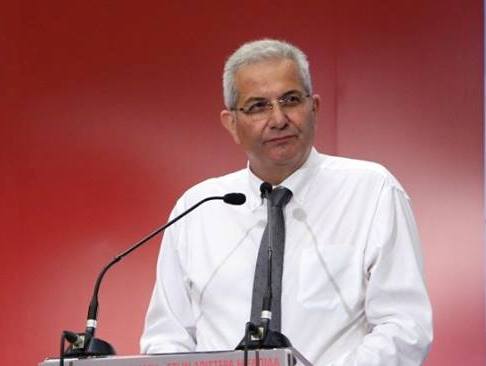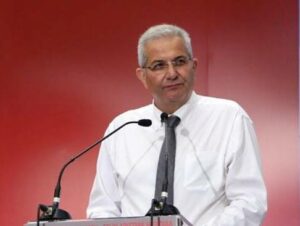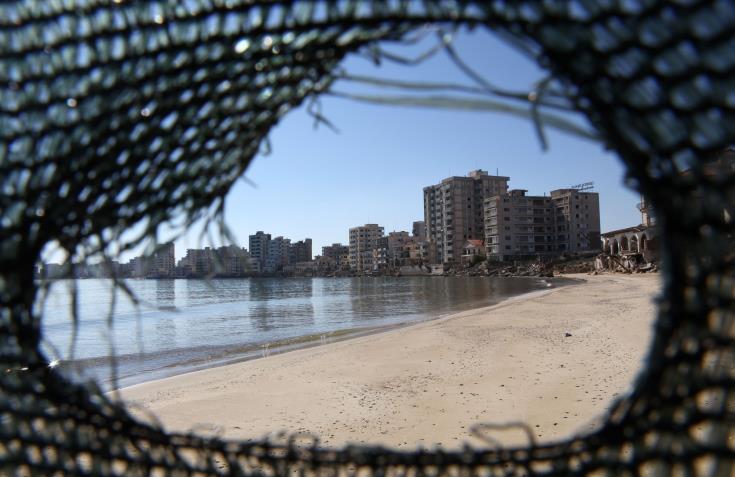
No federation is the same as another, but there are common characteristics in all federations without exception
Greeting of A. Kyprianou, General Secretary of the C.C. of AKEL, at the presentation of the book by Niyazi Kızılyürek “Federation in the World, Federal Cyprus”
1st March 2016, Nicosia
 Permit me to begin by congratulating Professor Niyazi Kızılyürek for the publication of a very interesting book. I am sure that in the debate that will follow both the content and various aspects of the “federation” issue will be discussed. The people who will shortly present the book know the Cyprus problem and the issues concerning a federal solution quite well. I am sure that the debate will go into some depth on the issue and be very interesting.
Permit me to begin by congratulating Professor Niyazi Kızılyürek for the publication of a very interesting book. I am sure that in the debate that will follow both the content and various aspects of the “federation” issue will be discussed. The people who will shortly present the book know the Cyprus problem and the issues concerning a federal solution quite well. I am sure that the debate will go into some depth on the issue and be very interesting.
On my part, I just want to note just a few points. Most of these are drawn from our bitter experience in Cyprus. Anyone who studies the modern history of the Cyprus problem can easily observe that when the choice is made to abandon what has been agreed on the solution of the Cyprus problem for petty-political expediencies or other reasons Cyprus gets into adventures, each time even more dangerous than before. Whenever the policy promoting the distancing from the agreed framework for the solution of the Cyprus problem has been pursued, Turkey found the opportunity to put officially on the negotiating table its own unacceptable positions, while the Greek Cypriot side was held responsible for the deadlock.
“Decentralized federation”, “loose federation”, “federation with the correct content”, “bi-communal, but not bi-zonal federation”. Political forces in the Greek Cypriot side that in words at least have accepted federation as the solution we are aiming towards have subjected the whole concept of federation to a trail, and a lot more. The first thing most of them refuse to recognize and are trying to conjure up another nomenclature, other concepts, content and at the end of the day another solution is obvious: the framework of the solution of the Cyprus problem as agreed by the Greek Cypriot side with the Turkish Cypriot community and the international community is not something open to all kinds of interpretation to suit any interests. The consequences – should we now decide that we want to change this framework – will be to our detriment only.
We have agreed decades ago what kind of a solution we are seeking. I’m sure you’ve all heard the rhetorical questions set by certain forces and circles against a bi-communal, bi-zonal federation. I’m sure you’ve all noticed that they begin with the question “Have you seen anywhere in the world such a solution like the one that they want to impose on us in Cyprus?”
What is the brief reply to this question? Indeed there is no federation that is the same as another. However, there are common features and characteristics in all federations without exception; characteristics which, inter alia, ensure the equality of the regions, the administration of the region and the effective participation of the regions in the central power.
All federations without exception have a single sovereignty, a single international personality and a single citizenship and safeguard human rights and fundamental freedoms.
Neither can the concept of zonality be the pretext to say one thing today and something else the other day. Zonality concerns the existence of two zones or whatever it may be called, each of which will be administered by the respective community. This reference is included in a host of UN Security Council Resolutions. Regarding the concept of “bi-communal”, as this is defined by the UN itself, it means that both communities will participate effectively in the bodies and decisions of the central government. This is an element that was also included in the 1960 Constitution.
I am also sure that you have also heard as many times all the talk about the “dissolution of the Republic of Cyprus”. Whenever negotiations are underway such reports flourish. AKEL’s position is very clear. The transformation of the Republic of Cyprus, and not its dissolution, is the pressing goal. This however will be ensured with the content of the solution itself and not by sloganeering and empty words during the pre-election period. The transformation is ensured basically by the continuity of the state in international organizations of an inter-state character (for example, the United Nations, European Union), as well as by the continuation of the international treaties binding the state and by the prohibition of any secession. All this had been agreed between Demetris Christofias and Talat and reaffirmed between N. Anastasiades – Akinci.
If I repeat all this today and become insistent it is because we are approaching elections. The Cyprus problem has literally suffered during the various election campaigns. The procedure of its solution has experienced major setbacks when petty-party considerations or elections were put over and above anything else. AKEL’s vision for Cyprus goes far beyond any expediencies or subsequent election. We envision a Cyprus, a common homeland, a common home for Greek Cypriots, Turkish Cypriots, Maronites, Armenians and Latins, the outcome of a solution based on the agreed framework.
We envisage a bi-communal, bi-zonal federal solution that will liberate us from the occupation and from any interventions in our internal affairs; a solution that will isolate any fascist and chauvinist elements, not allowing them to undermine it. The transformation of the Republic of Cyprus must lead to a united state; a state with a single and indivisible sovereignty, a single citizenship and a single international personality, with political equality; a solution without guarantees and rights of intervention and with human rights and fundamental freedoms guaranteed for all.
Greek Cypriots and Turkish Cypriots have had enough of the loud pompous slogans of irredentism. We have had enough of the myths that do not allow us to heal the wounds and move forward; enough of big empty words all these years.
Let me humbly say that I am proud that as AKEL all these years we have been brave enough to tell the truth – even though this had a cost for us. For the first time a President of the Republic of Cyprus was bold enough to talk about the crimes committed by Greek Cypriot nationalism against Turkish Cypriots. We defended this truth, regardless of the fierce war that was unleashed against AKEL. Greek Cypriots and Turkish Cypriots have also had enough of people who hold our fate in their hands and are trying to reconcile two different and contradictory policies. On the one hand, they are talking about an honorable compromise and on the other hand they make statements for domestic consumption. On the one hand they pay tribute and lay wreaths to those who brought destruction on our people and on the other hand they say they want to cultivate a culture of reunification.
Today more than ever before it is imperative that we all understand that Cyprus is our common homeland; that the Republic of Cyprus is our common home and that we can live in harmony and fraternity without any “mother-countries”.
All these years, steps have been taken in this direction, with AKEL time and again at the forefront of this process. Niyazi, like many others, remembers very well how many attacks we came under back then in the early 1990’s, when we devoted all our political forces to attain the establishment of the University of Cyprus. Back then we were told that we are threatening the “future of Hellenism” and that we will deprive Cypriot youth of its link with the “Metropolitan Hellenism”, namely Greece. Niyazi remembers very well how inconceivable it was for certain circles and forces to accept that there are Turkish Cypriots, our compatriots, that can and must be our classmates, fellow students, roommates and lecturers, co-habitants in our common home, the Republic of Cyprus.
Hopefully we will soon be able to root out once and for all that gave birth to fanaticism, hatred, intolerance and chauvinism. Hopefully soon we will be able to fulfill our duty to the new generation: to deliver it the Cyprus of the future; a Cyprus free from the nightmares of the past.
The book written by Niyazi I am sure will contribute in this direction.




